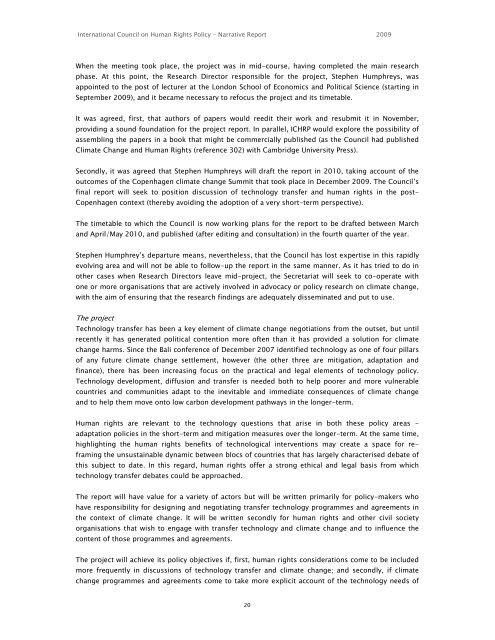NARRATIVE REPORT 2009 - The ICHRP
NARRATIVE REPORT 2009 - The ICHRP
NARRATIVE REPORT 2009 - The ICHRP
You also want an ePaper? Increase the reach of your titles
YUMPU automatically turns print PDFs into web optimized ePapers that Google loves.
International Council on Human Rights Policy - Narrative Report <strong>2009</strong><br />
When the meeting took place, the project was in mid-course, having completed the main research<br />
phase. At this point, the Research Director responsible for the project, Stephen Humphreys, was<br />
appointed to the post of lecturer at the London School of Economics and Political Science (starting in<br />
September <strong>2009</strong>), and it became necessary to refocus the project and its timetable.<br />
It was agreed, first, that authors of papers would reedit their work and resubmit it in November,<br />
providing a sound foundation for the project report. In parallel, <strong>ICHRP</strong> would explore the possibility of<br />
assembling the papers in a book that might be commercially published (as the Council had published<br />
Climate Change and Human Rights (reference 302) with Cambridge University Press).<br />
Secondly, it was agreed that Stephen Humphreys will draft the report in 2010, taking account of the<br />
outcomes of the Copenhagen climate change Summit that took place in December <strong>2009</strong>. <strong>The</strong> Council’s<br />
final report will seek to position discussion of technology transfer and human rights in the post-<br />
Copenhagen context (thereby avoiding the adoption of a very short-term perspective).<br />
<strong>The</strong> timetable to which the Council is now working plans for the report to be drafted between March<br />
and April/May 2010, and published (after editing and consultation) in the fourth quarter of the year.<br />
Stephen Humphrey’s departure means, nevertheless, that the Council has lost expertise in this rapidly<br />
evolving area and will not be able to follow-up the report in the same manner. As it has tried to do in<br />
other cases when Research Directors leave mid-project, the Secretariat will seek to co-operate with<br />
one or more organisations that are actively involved in advocacy or policy research on climate change,<br />
with the aim of ensuring that the research findings are adequately disseminated and put to use.<br />
<strong>The</strong> project<br />
Technology transfer has been a key element of climate change negotiations from the outset, but until<br />
recently it has generated political contention more often than it has provided a solution for climate<br />
change harms. Since the Bali conference of December 2007 identified technology as one of four pillars<br />
of any future climate change settlement, however (the other three are mitigation, adaptation and<br />
finance), there has been increasing focus on the practical and legal elements of technology policy.<br />
Technology development, diffusion and transfer is needed both to help poorer and more vulnerable<br />
countries and communities adapt to the inevitable and immediate consequences of climate change<br />
and to help them move onto low carbon development pathways in the longer-term.<br />
Human rights are relevant to the technology questions that arise in both these policy areas -<br />
adaptation policies in the short-term and mitigation measures over the longer-term. At the same time,<br />
highlighting the human rights benefits of technological interventions may create a space for reframing<br />
the unsustainable dynamic between blocs of countries that has largely characterised debate of<br />
this subject to date. In this regard, human rights offer a strong ethical and legal basis from which<br />
technology transfer debates could be approached.<br />
<strong>The</strong> report will have value for a variety of actors but will be written primarily for policy-makers who<br />
have responsibility for designing and negotiating transfer technology programmes and agreements in<br />
the context of climate change. It will be written secondly for human rights and other civil society<br />
organisations that wish to engage with transfer technology and climate change and to influence the<br />
content of those programmes and agreements.<br />
<strong>The</strong> project will achieve its policy objectives if, first, human rights considerations come to be included<br />
more frequently in discussions of technology transfer and climate change; and secondly, if climate<br />
change programmes and agreements come to take more explicit account of the technology needs of<br />
20
















